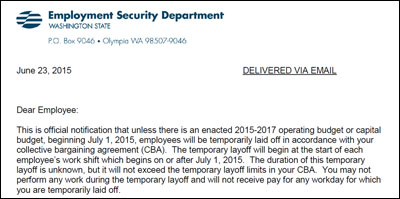NEWS ROUNDUP
Dear Employee, Obama’s big win, Mr. Muilenburg, war on unions…
Wednesday, June 24, 2015
STATE GOVERNMENT
 ► In today’s News Tribune — State employees start receiving temporary layoff notices — Thousands of state employees in Washington state received notice Tuesday that they may be temporarily laid off if a new state budget isn’t adopted by early next week.
► In today’s News Tribune — State employees start receiving temporary layoff notices — Thousands of state employees in Washington state received notice Tuesday that they may be temporarily laid off if a new state budget isn’t adopted by early next week.
EDITOR’S NOTE — “Dear Employee…” Really?
► From WFSE — Senate Republican-caused notice of temporary layoffs going out today — If you’re one of the 26,000 state employees scheduled to get a notice of temporary layoff if the Senate Republicans force a shutdown on July 1, you’re probably getting those notices in your e-mail today.
► In today’s Olympian — Decision time: To tax or not to tax (editorial) — Lawmakers obviously need to cut a deal that avoids such a shutdown. And as lawmakers move closer to needing a third special session, our message is blunt: Senate Republicans need to budge on raising taxes.
 ► In today’s Columbian — State employees: Shutdown would put public safety at risk — On Tuesday afternoon, David Holbrook said he received an impersonal email warning him he would be temporarily laid off starting the first of July if lawmakers don’t pass a two-year operating budget. Holbrook, a Hazel Dell resident, is a community corrections officer who supervises about 40 convicted felons — many of them violent offenders — who have be released from custody.
► In today’s Columbian — State employees: Shutdown would put public safety at risk — On Tuesday afternoon, David Holbrook said he received an impersonal email warning him he would be temporarily laid off starting the first of July if lawmakers don’t pass a two-year operating budget. Holbrook, a Hazel Dell resident, is a community corrections officer who supervises about 40 convicted felons — many of them violent offenders — who have be released from custody.
► From KUOW — Drought could bring more sting to state shutdown — The Department of Ecology’s drought coordinator says the state won’t be able to grant emergency permits to access water if your well dries up or if river levels drop so low that your pipes no longer reach the water. There also won’t be anyone to enforce state water restrictions or look into illegal water use complaints.
► MUST READ from Bill’s Blog — The real problem with Washington’s schools (by Bill Keim) — Two new reports paint a picture of remarkable achievement in Washington’s schools. In spite of some of the worst financial support in the nation, our teachers and administrators have achieved some of the highest outcomes with and on behalf of our students…. These two independent analyses lead one to the undeniable conclusion that the problem with Washington’s education system won’t be found in our classrooms, it’s in our halls of government.
FAST TRACK
 ► From the Hill — Obama poised for huge win on trade — President Obama is poised for one of the biggest victories of his second term after the Senate voted Tuesday to advance legislation enhancing his trade powers. The Senate’s 60-37 vote sets the stage for passage on Wednesday of the trade-promotion authority (TPA) bill, or fast-track.
► From the Hill — Obama poised for huge win on trade — President Obama is poised for one of the biggest victories of his second term after the Senate voted Tuesday to advance legislation enhancing his trade powers. The Senate’s 60-37 vote sets the stage for passage on Wednesday of the trade-promotion authority (TPA) bill, or fast-track.
ALSO at The Stand — Murray, Cantwell put Fast Track over the top
► From KPLU — State labor groups suffer defeat as Senate moves ahead with trade bill — For the Washington State Labor Council, blocking this fast-track bill has been high priority for the past 18 months. “We’ve run phone banks. We’ve door-knocked. We’ve put on a campaign like we’ve never done before on a piece of Congressional legislation,” said WSLC President Jeff Johnson.
ALSO at The Stand — Senate vote ‘huge loss’ for workers, but TPP fight isn’t over
 ► From Huffington Post — Trade fight’s biggest winners and losers — WINNERS: 1. Barack Obama 2. Mitch McConnell 3. PhRMA 4. Nike 5. Sherrod Brown. LOSERS: 1. Barack Obama 2. Labor unions 3. Patty Murray — In May, Murray urged colleagues who were thinking about cutting a deal with McConnell to drive a hard bargain. Then she and Sen. Maria Cantwell agreed to team up with Republicans in exchange for a vote to reauthorize the Export-Import Bank. It was never a very good idea. Reauthorizing the bank was also never going to pass the House, where Republicans are overwhelmingly opposed to it. But then McConnell humiliated Murray and Cantwell by making his promised Ex-Im vote an entirely nonbinding procedural stunt. Both senators ended up voting for the fast-track bill again anyway. Murray bumps Cantwell from this list due to her leadership position. 4. Senate Democrats: Democrats had McConnell over a barrel after they successfully filibustered fast-track in May. They ended up getting… nothing. 5. Sick poor people.
► From Huffington Post — Trade fight’s biggest winners and losers — WINNERS: 1. Barack Obama 2. Mitch McConnell 3. PhRMA 4. Nike 5. Sherrod Brown. LOSERS: 1. Barack Obama 2. Labor unions 3. Patty Murray — In May, Murray urged colleagues who were thinking about cutting a deal with McConnell to drive a hard bargain. Then she and Sen. Maria Cantwell agreed to team up with Republicans in exchange for a vote to reauthorize the Export-Import Bank. It was never a very good idea. Reauthorizing the bank was also never going to pass the House, where Republicans are overwhelmingly opposed to it. But then McConnell humiliated Murray and Cantwell by making his promised Ex-Im vote an entirely nonbinding procedural stunt. Both senators ended up voting for the fast-track bill again anyway. Murray bumps Cantwell from this list due to her leadership position. 4. Senate Democrats: Democrats had McConnell over a barrel after they successfully filibustered fast-track in May. They ended up getting… nothing. 5. Sick poor people.
► From Reuters — U.S. trade negotiator poised to close on Pacific trade pact — The chief U.S. agricultural negotiator says she is just a few phone calls and meetings away from wrapping up loose ends with her counterparts for a massive Pacific trade deal.
► From PBS — What you need to know about the Trans-Pacific Partnership — Given the difficult and convoluted passage of Fast Track legislation, we may be sure that once the final TPP is concluded and the final text released, it will be vigorously condemned by the AFL-CIO, several non-governmental organizations like Public Citizen and the Sierra Club, and many members of Congress. Getting to “yes” on the TPP will be just as hard as getting to “yes” on Fast Track. Knowing that a full dress battle awaits, it’s worth reviewing the main elements of the Trans-Pacific Partnership.
BOEING
► In today’s Seattle Times — Muilenburg started as Boeing intern; now he’s CEO — Jim McNerney, the outsider who wrenchingly transformed Boeing into a bicoastal manufacturer while extracting major concessions from union members and state officials, will step down July 1 after a decade as CEO and hand the reins to Dennis Muilenburg, a 30-year company man who started as an engineering intern.
► From IAM 751 — IAM 751 president to new CEO: Invest in workforce — Jon Holden: “CEOs come and CEOs go, but District 751 Machinists have been the driving force behind Boeing’s success for the past 80 years, and that hasn’t changed. We welcome Boeing’s announcement that Dennis Muilenburg is taking over as CEO and encourage him to invest in the workforce and recognize the value of each and every employee at the Boeing Co.”
 ► From Leeham News (in January) — Muilenburg’s challenges as Boeing CEO — Muilenburg’s entire Boeing career until he was named No. 2 in December 2013 was in Boeing’s defense unit. With no experience in Boeing Commercial Airplanes, which now accounts for the majority of the revenues and profits because of declining defense budgets, he faces unfamiliar territory despite a mere year (and a half) as vice chairman, president and COO of the corporation.
► From Leeham News (in January) — Muilenburg’s challenges as Boeing CEO — Muilenburg’s entire Boeing career until he was named No. 2 in December 2013 was in Boeing’s defense unit. With no experience in Boeing Commercial Airplanes, which now accounts for the majority of the revenues and profits because of declining defense budgets, he faces unfamiliar territory despite a mere year (and a half) as vice chairman, president and COO of the corporation.
► From Leeham News (in January) — Muilenburg remains an enigma for unions, commercial development — A consultant who has worked with Boeing believes Muilenburg will be most cost-driven than McNerney, which will be bad news for labor and for the supply chain.
► From AP — Flight attendants sue Boeing, claim injury from engine fumes — Four flight attendants are suing Boeing, claiming that toxic air from an engine leaked into their plane and made them seriously ill on a 2013 flight.
LOCAL
► In today’s (Longview) Daily News — Falling West Coast exports dampen loggers’ sales — Fewer logs are leaving West Coast docks this year, as Asian demand shifts toward other regions because of the stronger U.S. dollar. That could mean fewer hours for longshoremen and logging contractors as timberland owners clamp down on harvests as a result.
EDITOR’S NOTE — Why currency manipulation kills jobs.
► From Think Progress — Migrant workers allegedly weren’t paid for a month of work on blueberry farm — Between 30 and 35 farm workers have filed a class-action lawsuit against Golden Eagle Farms in Washington State for failing to pay them for their work planting blueberry bushes last year.
ALSO at The Stand — Sakuma farm workers win better conditions, but want union contract
► In today’s Yakima H-R — No chemical leak found after 37 Selah plant employees sent to hospital — Thirty-seven workers at a fruit packaging plant were sent to a local hospital Tuesday after having trouble breathing, but emergency workers could find no traces of hazardous chemicals in the building.
► From AP — Attorney General: Minimum wage surcharges must be disclosed — State Attorney General Bob Ferguson says businesses can add surcharges as a way to cover the costs of new minimum wage laws in some cities, but those charges must be clearly disclosed.
FEDERAL GOVERNMENT
► In today’s Washington Post — Bipartisan Senate bill would fund transportation for 6 years — Breaking a deadlock that threatened federal highway funding, a bipartisan coalition of senators on Tuesday introduced a six-year bill that would boost overall spending on U.S. roads and bridges. Working against a July 31 deadline, the senators acknowledged that it will be an uphill effort to corral their Senate colleagues and the House to pass a bill. And looming larger — as it has for several years — is the question of how to pay for it.
NATIONAL
 ► From Huffington Post — How unions improve the lives of every worker (by Laura Reyes of AFSCME) — It’s well established that union members earn substantially more than nonunion workers ($207 more a week), and are more likely to have health care coverage and solid pensions. What is less well known are the advantages that unions provide for all workers, not just those who belong to unions. It’s a fact: We’ve been creating pathways to the middle class for American workers for more than a century. Not only in the higher pay that all workers get – whether they’re union or not – in areas where unions are strong. But also in rights and protections that we fought to have enshrined in law.
► From Huffington Post — How unions improve the lives of every worker (by Laura Reyes of AFSCME) — It’s well established that union members earn substantially more than nonunion workers ($207 more a week), and are more likely to have health care coverage and solid pensions. What is less well known are the advantages that unions provide for all workers, not just those who belong to unions. It’s a fact: We’ve been creating pathways to the middle class for American workers for more than a century. Not only in the higher pay that all workers get – whether they’re union or not – in areas where unions are strong. But also in rights and protections that we fought to have enshrined in law.
► In the Washington Post — Realistic ways policymakers could strengthen collective bargaining (by Jared Bernstein) — Diminished bargaining power is at the heart of my diagnosis as to why the U.S. economy so often delivers growth without broadly shared prosperity. While increased collective bargaining is by no means the sole prescription implied by that diagnosis—full employment is a critical bargaining-power booster for the less advantaged – it’s got to be part of the solution. Turning around the low coverage share is unquestionably a daunting challenge, and while it’s a fine long-term goal, getting there requires several intermediate steps along the way. Here is a list of some of those steps. I’d argue that they’re within reach, if we’re willing to fight for them.
► From Think Progress — Lawmakers unanimously approve country’s most robust paid sick leave law — In Montgomery County, Maryland, employees at businesses with five or more workers will be able to earn up to seven days off a year, while those at companies with fewer workers can earn four paid days and three unpaid.
 ► From AFL-CIO Now — Show solidarity with Ink Master workers — Share your labor-friendly tattoos on Twitter and Instagram with the hashtag #InkMasterUnion to show solidarity with the men and women who make the hit TV show “Ink Master.” Workers at “Ink Master” voted overwhelmingly for a union last year. Since then, Original Media, the master behind “Ink Master,” has refused to bargain in good faith.
► From AFL-CIO Now — Show solidarity with Ink Master workers — Share your labor-friendly tattoos on Twitter and Instagram with the hashtag #InkMasterUnion to show solidarity with the men and women who make the hit TV show “Ink Master.” Workers at “Ink Master” voted overwhelmingly for a union last year. Since then, Original Media, the master behind “Ink Master,” has refused to bargain in good faith.
► From Huffington Post — Ikea’s minimum wage hike was so successful, it’s raising wages again — A year after it first announced a major minimum wage hike in its U.S. stores, Ikea said Wednesday that it plans to implement another nationwide raise to its wage floor next year, bringing the average store’s starting pay to nearly $12 per hour.
► From On Labor — Restrictions on labor picketing cannot stand (by ) — For decades the Supreme Court has allowed restrictions on labor picketing, but its recent decision striking down a town’s sign ordinance makes clear that the limits on labor speech can no longer survive First Amendment scrutiny.
WAR ON UNIONS
 ► From AP — Dispute over union fees could return to Supreme Court — Powerful public-sector unions are facing another high-profile legal challenge that they say could wipe away millions from their bank accounts and make it tougher for them to survive. A group of California schoolteachers, backed by a conservative group, has asked the Supreme Court to rule that unions representing government workers can’t collect fees from those who choose not to join. Half the states currently require state workers represented by a union to pay “fair share” fees that cover bargaining costs, even if they are not members. The justices could decide as early as next week whether to take up the case… If the high court takes the latest case and rules against the union, labor officials say it could sap finances at all unions representing teachers, firefighters and other government workers. It could also lead to the exodus of thousands of union members who will wonder why they should pay union dues at all if nonmembers get the same representation for free. The union would still have a duty to represent workers who pay nothing.
► From AP — Dispute over union fees could return to Supreme Court — Powerful public-sector unions are facing another high-profile legal challenge that they say could wipe away millions from their bank accounts and make it tougher for them to survive. A group of California schoolteachers, backed by a conservative group, has asked the Supreme Court to rule that unions representing government workers can’t collect fees from those who choose not to join. Half the states currently require state workers represented by a union to pay “fair share” fees that cover bargaining costs, even if they are not members. The justices could decide as early as next week whether to take up the case… If the high court takes the latest case and rules against the union, labor officials say it could sap finances at all unions representing teachers, firefighters and other government workers. It could also lead to the exodus of thousands of union members who will wonder why they should pay union dues at all if nonmembers get the same representation for free. The union would still have a duty to represent workers who pay nothing.
The Stand posts links to Washington state and national news of interest every weekday morning by 10 a.m.





